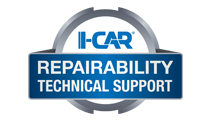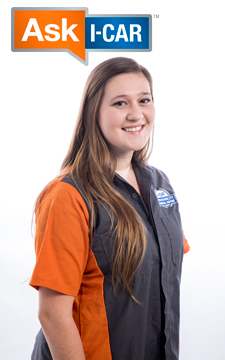Hyundai Position Statement: Pre- And Post-Repair System Scanning - UPDATE
Posted on 23 June 2025Hyundai released an updated position statement relating to pre- and post-repair system scanning.
Refinishing Park Assist Sensors: Hyundai
Posted on 7 March 2025Park assist sensors are part of the park assist system, just one of many advanced driver assistance systems (ADAS) found on vehicles today. Damaged sensors are typically replaced and may require painting to match the vehicle. Vehicle makers often provide information on the painting of new sensors. Some vehicle makers do not recommend refinishing sensors with minor finish damage because excessive paint thickness may adversely affect the operation of the park assist system. However, other vehicle makers allow refinishing and provide guidelines. Let’s see what Hyundai has to say.
Bumper Cover Repair With ADAS: Hyundai - UPDATE
Posted on 27 February 2025A simple bumper repair on a modern vehicle may not be as simple as it seems. New technologies like blind spot monitoring, adaptive cruise control, and other advanced driver assistance systems (ADAS) utilize sensors behind the bumper covers. The ability for these sensors to be able to see clearly requires special caution when considering a bumper repair. Many OEMs have different requirements when it comes to repairing bumper covers with ADAS. So, what does Hyundai say on the subject?
Hyundai/Genesis Releases Bumper Cover Repairability Position Statements
Posted on 31 January 2025Hyundai and Genesis released position statements about repairing bumpers with advanced driver assistance systems (ADAS) sensors.
I-CAR Hyundai Collision Repair And Electromechanical Repair Courses
Posted on 14 February 2024I-CAR has developed courses that go into detail on electromechanical repair for Hyundai and a general collision repair overview as well.
Calibration Research Tips: Hyundai/Genesis Driver Parking Assistance System
Posted on 25 May 2023While searching for information on advanced driver assistance systems (ADAS) on an OEM repair information site, you may come across unique calibration procedures or events. These events can vary by year and model, even within a particular make. As the RTS team has been researching these systems, we have been identifying these atypical circumstances. In order to help you better understand them, we are putting together a series of articles that help with the repair and calibration of ADAS. Let’s take a closer look at Hyundai.
Locating OEM-Approved ADAS Tools: Hyundai
Posted on 10 December 2021When researching calibration procedures for advanced driver assistance systems (ADAS), you may notice that many of the procedures require the use of specific tools. Some tools may be everyday items like string, tape, levels, paper, etc. However, many of them are OEM-specific tools or scan tools. Often identifying and locating where to purchase these specific tools can be difficult.
Where Do I Find Other Types Of Information In Hyundai?
Posted on 20 November 2020Navigating OEM websites can be challenging when searching for collision repair procedures, especially as no two OEM websites are alike. What happens when you need to find other types of repair information, such as, "What needs to be inspected after a supplemental restraints system (SRS) deployment", or "Does the tire pressure monitoring system (TPMS) require a scan tool or specialty tool?" Let's take a closer look at the Hyundai website.
Advanced Driver Assistance Systems: 2020 Hyundai Palisade
Posted on 28 October 2020While many have noticed that advanced driver assistance systems (ADAS) are showing up on vehicles, there still is confusion on what is required of these systems after a collision occurs. The Ask I-CAR team frequently gets questions in regard to calibration of ADAS. Many of these questions can be answered simply by using the OEM Calibration Requirements Search. However, there are some questions that may need more details than the calibration search provides. Let’s take a look at the 2020 Hyundai Palisade.
Calibration Research Tips: Hyundai Variant Coding
Posted on 9 September 2020While searching for information on advanced driver assistance systems (ADAS) on an OEM repair information site, you may come across unique calibration procedures or events. These events can vary by year and model, even within a particular make. As the RTS team has been researching these systems, we have been identifying these atypical circumstances. In order to help you better understand them, we are putting together a series of articles that help with the repair and calibration of ADAS. Let’s take a closer look at Hyundai variant coding procedures.
Repairer Driven News: Hyundai To Incorporate Smart Cruise Control In Future Vehicles
Posted on 22 October 2019Hyundai recently announced its plans to introduce a new artificial intelligence (AI) based cruise control system to future vehicles. This will better match the adaptive cruise control system to individual driving style.
Advanced Driver Assistance Systems: 2019 Hyundai Kona
Posted on 7 October 2019While many have noticed that advanced driver assistance systems (ADAS) are showing up on vehicles, there still is confusion on what is required of these systems after a collision occurs. The Ask I-CAR team frequently gets questions in regard to calibration of ADAS. Many of these questions can be answered simply by using the OEM Calibration Requirements Search. However, there are some questions that may need more details than the calibration search provides. Let’s take a look at the 2019 Hyundai Kona ADAS.
ADAS, Calibration, And Scanning Article Hotspot
Posted on 14 January 2019Since advanced driver assistance systems (ADAS), scanning, and calibration first started becoming relevant, members of the collision repair industry have required as much knowledge as possible on these subjects. I-CAR’s Repairability Technical Support (RTS) team continues to be on the leading edge of research and education. Our goal is to help communicate information to the industry, and a great way to do this is through Collision Repair News articles.
New ADAS Feature Available From Hyundai
Posted on 11 September 2018The 2019 Hyundai Santa Fe is bringing a new feature in child safety, called safe exit assist, which is standard on all trim levels. This concept expands on the traditional child safety lock which prevents passengers in the rear of the vehicle from opening doors and windows. To complement this feature, safe exit assist can help avoid catastrophe by preventing a child from opening the door when the vehicle is parked, and traffic is approaching from the rear.
Locating ADAS Information: Hyundai
Posted on 11 July 2018As a collision repair technician, there is one part of a service manual that houses all of the information you would ever need…right? This is not the case with modern vehicles. You may be required to look in numerous manuals to find the information required to safely repair the vehicle.
Hyundai Releases Position Statements
Posted on 30 March 2018Hyundai released two position statements this week relating to collision repair. Let’s take a look at what these statements are about.
Additional Calibration Requirements: Hyundai
Posted on 9 June 2017The addition of the OEM Calibration Requirements Search to the RTS portal was a big step for the collision industry. While this new feature has been well received, there has been some confusion about what is included in the search tool. The OEM Calibration Requirements Search is designed to provide information on the calibration requirements that are needed for vehicles equipped with advanced driver assistance systems (ADAS). This includes systems such as adaptive cruise control, lane keep assist, and collision braking.
What's That in the Grille?
Posted on 11 May 2017Have you noticed anything different looking on new vehicle grilles? If you have, you may have thought what is that strange looking flat spot? Sometimes this flat area is somewhat hidden by a manufacturer emblem. Other times it’s integrated into the grille itself, including grille lines. Let’s take a look at this new design element and what it’s hiding.
Hyundai Glass Replacement Requirements
Posted on 27 September 2016The role of the windshield is a lot more complex than simply allowing a view of the road ahead. It is considered a structural part of the vehicle as it contributes to the strength of the roof and A-pillars. The windshield helps to manage collision energy and has become an integral part of several advanced safety systems.








